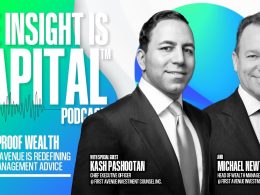More Ways to Get Media Attention
by Commonwealth Financial Network
 As I wrote in my previous blog post, “5 Ways to Get Media Attention,” if can be difficult—although certainly not impossible—to get positive media coverage in today’s viral video world. With that in mind, I outlined some tips to get you started, ranging from being polite and persistent to getting noticed in your local community. Now that you’ve had some time to think about how you might boost your credibility with these select marketing efforts, here are even more ways to get the media attention you need to gain visibility, develop relationships with key media contacts, and position yourself as an expert in your field.
As I wrote in my previous blog post, “5 Ways to Get Media Attention,” if can be difficult—although certainly not impossible—to get positive media coverage in today’s viral video world. With that in mind, I outlined some tips to get you started, ranging from being polite and persistent to getting noticed in your local community. Now that you’ve had some time to think about how you might boost your credibility with these select marketing efforts, here are even more ways to get the media attention you need to gain visibility, develop relationships with key media contacts, and position yourself as an expert in your field.
Tracking down the individuals most likely to cover you and your practice is worth the effort—as these are the reporters you can build relationships with and who will be more likely to use you as a source or be open to covering your story. Keep in mind, though, that you’ll sometimes have to contact four or five different editors or assistant editors at a news outlet, especially if you live in a large metro area, before you connect with the right reporters. Here’s a good strategy to get started:
- Search the news outlet’s website for stories that are similar in scope to what you envision for your potential contributions.
- Take note of the reporters in any relevant bylines—they are likely the ones who cover your beat.
- When you inevitably reach out to them, comment on a particular article or articles (if applicable), so they know you’re taking note and targeting your pitch.
Of course, you can always reach further than your local reporters. Another avenue is to connect with a freelance writer who contributes frequently to the newspapers you’re targeting and who specializes in writing about subjects related to your expertise. You could also contact the local chapter of the Society of Professional Journalists. Offer to hold a seminar for its members to help them demystify a financial topic or answer questions they have about financial planning. Remember, you’re looking for press coverage—not clients—so don’t trot out your usual pitch to the pre-retiree set. The goal here is to provide an information-only talk to help them do their jobs better, plus make some valuable contacts.
Writing a letter or guest editorial to the newspaper is a great way of getting media coverage, but what’s the difference between the two?
- A letter is short and usually written in response to something previously published in the paper.
- A guest editorial, often called an op-ed piece because it appears on the page opposite the paper’s own editorials, is longer and can be written about anything.
Either way, you want to write about something that really moves you, as that’s what makes compelling reading. Even if it doesn’t make it to print, it still has a good chance of finding its way onto the outlet's website, which gives you linking privileges. Then, if it’s well-received, you could make the case that its readership could benefit from having you as a regular guest contributor—weekly, biweekly, or monthly. With a recurring placement in a local news outlet under your belt, your next step could be pitching a similar idea to a more widely-distributed publication. See how your exposure can build over time?
If you’re looking to expand beyond the local scene and would like to get your news out fast to a nationwide audience, consider working with a publicity service that distributes news releases electronically to newsrooms around the country. Two of the most widely used providers are PR Newswire and Business Wire. Both also offer an array of accompanying multimedia services—including press release optimization and targeting, social media engagements and audience analysis, and results reporting.
At the same time, don’t forget to e-mail your release to your media contacts. Be sure to include your e-mail address in the “to” field and all others in the “bcc” line so they can’t see one another, and distinguish your e-mail by including “PRESS RELEASE” in the subject line before the actual title of your announcement. If desired, compose a separate e-mail with a brief note to a specific reporter if you think he or she may be particularly interested—your personalized approach will be appreciated!
If you’re hoping to make an appearance on a local TV or radio station, start with the producers of your local PBS, cable access, community affairs, or roundtable shows: They are the ones who usually book the guests (not the talent). If you’re targeting a newscast, be prepared to propose an idea for a two- or three-minute segment. Considering a roundtable or a local affairs-type show? You’ll need to present an entire show idea.
Be sure to provide a potential theme, as well as a list of experts (other than yourself!) who might be willing to be on the show. Also, offer to share your resources to make the show happen. Can you contact the other guests, or provide background material to brief the host? The more you do for the producer in creating an entire show, the more likely you are to get booked.
It’s best practice to contact your most important media outlets at least once every few weeks—you want to stay top of mind. Just say “hi,” provide a news tip, or offer a story idea. If you e-mail a release, always follow up with your important media contacts. When you get them on the phone, don’t ask if they received your news release. Rather, ask if they’re interested in covering whatever it is you’re telling them about. This increases your chances of getting them into a dialogue.
This outreach can be via social media, too. Keep an eye on what articles your contacts are posting on LinkedIn or topics they’re tweeting about and then chime in on the conversation. Engaging on social channels is an easy and nonintrusive way to stay front of mind, have your voice heard publicly, and keep up with what’s making your target’s headlines.
Whether you’re hoping to make an appearance on a local TV show or connecting with a reporter who covers the financial beat, you must provide them with information that's newsworthy. This means telling a story, focusing on the benefits of your services, and explaining how it will help people, especially the readers or viewers for the media you are approaching. You might not always get the immediate response you’re looking for, but don’t give up. Be persistent and always follow up. These are the true keys to media success.
Do you have any tips for staying top of mind with the media? Have you used a PR service to distribute your news releases? Please share your thoughts with us below!
Commonwealth Financial Network is the nation’s largest privately held independent broker/dealer-RIA. This post originally appeared on Commonwealth Independent Advisor, the firm’s corporate blog.
Copyright © Commonwealth Financial Network
















